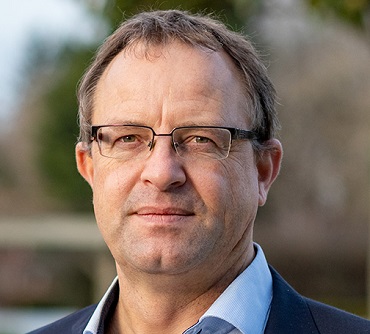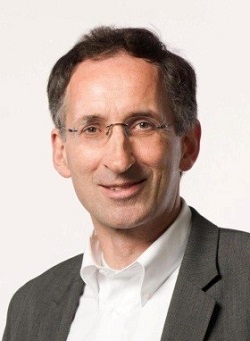
Dr. Jens Zimmermann has focused his scholarly attention on Christian humanism.
Regent College’s J.I. Packer Professor of Theology Jens Zimmermann is hosting an online public lecture series called Human Flourishing in a Technological Age.
This series is being offered in conjunction with Dr. Zimmermann’s winter seminar course and his ongoing Human Flourishing Project.
Mary Frances Giles recently chatted with him to find out more about this lecture series and his work in the area of Christian humanism.
Tell us a bit about the Human Flourishing Project: How did it come about, and how does it connect to the previous work you’ve done regarding Christian humanism?
The Human Flourishing Project grew directly out of my research in Christian humanism. Christian humanism is basically the Christian answer to the question, “What does it mean to be a human being?” Christians have always looked to God becoming human – to the incarnation – to answer this question.
Early Christian theologians argued that in becoming human, the Second Person of the Trinity assumed a particular human body, truly becoming a particular human being. How this can be is a great mystery, of course, but the incarnation became the starting point for working out important truths about human identity.
For example, without the incarnation, we would have never arrived at the modern concept of personhood. The idea that a person is an enspirited body, irreducible to either flesh or spirit, developed out of the Christian belief that in Jesus, humanity and divinity were united in one unique person.
Without this concept, we would not have the emphasis on personal dignity and human rights that are foundational to modern societies. The early church also believed that God’s becoming human was the means of salvation.
In Jesus, God summed up or recapitulated all of humanity in order to show us the perfect human being, the true image of God. So early Christian humanists believed that by sharing in Christ’s humanity we could become truly human by becoming like him in charity and immortality.
The connection between this Christian humanism and the Human Flourishing Project is not hard to see: today we look to technology for our salvation. We think technology will help us overcome disease, will cure us of social ills, and – if you believe transhumanists – even make us immortal.
Once I saw this connection, I assembled an interdisciplinary group of scholars to discuss our human identity and how technology shapes our self-perception. For example, how does technology change our understanding of aging, or of suffering? The lectures given in this course are the result of this three-year-long research project.
Humanism is a hot topic right now. In what ways do you feel that this project, specifically as it pertains to Christian humanism, is important for the broader Christian community? Why should this matter to the church?
I think this project should matter not only to the church but also to the broader culture – that is, to anyone concerned about what it means to be human. I don’t think technology discriminates between users.
Fundamentalist Christians and dogged secularists both carry iPhones, right? Christians and non-Christians use dating apps, don’t they? Technology, of course, can be very helpful. No one disputes that.
However, we currently experience an unprecedented pervasive tech presence in every nook and cranny of our lives. I think we are turning too much into tech-chauvinists, thinking that there is a technological solution for human problems. Therefore, we don’t even notice how we begin to view every problem in terms of technology.
I think it is time for both Christian and secular humanists to collaborate in preserving human dignity and freedom from the many ways, both subtle and obvious, in which it is being undermined by technology.
What do you hope people will glean from this lecture series, especially at this particular cultural moment?
I want people to think critically about technology and rediscover the rich heritage we have, in both theology and philosophy, for understanding our human identity.
Our speakers are seasoned, well-respected scholars who will offer us insights into different crucial areas affected by technology. My hope is for people to rediscover that being human is a vocation.
For Christians, and members of other religions, this vocation is to become like God in loving others and caring for the world. Yet even non-Christians can agree that being human is becoming human in the pursuit of what is true, noble, good, and beautiful.
Becoming human takes effort. But all too often, technology promises that we can become human without much effort – and, therefore, we become something else in the process. If people start thinking about that, and what a healthy, truly humane society might look like, then this lecture series will have been successful.

Dr. Thomas Fuchs
The 10 lectures, one already completed, continue into April:
- January 29: Dr. Robert Doede: The West’s Journey from Living Souls to Software Selves
- February 5: Rev. Dr. John Behr: Being Human in a Technological World – Pointers from Patristic Anthropology
- February 12: Dr. Jens Zimmerman: Who Am I? Personhood, Technology and Human Flourishing
- February 26: Dr. Thomas Fuchs: Embodied Cognition and Psychiatry in a Technological World
- March 5: Dr. David Lewin: Education, Enhancement and the Pursuit of the Good
- Five more lectures March 12 – April 16
You can find out more and register for the ‘Human Flourishing in a Technological World’ lectures here.
Dr. Jens Zimmermann was born and raised in Germany. He earned his first PhD at UBC, in Comparative Literature in 1997. He taught at UBC briefly before moving on to Trinity Western University from 2006 – 2016. In 2010, Jens earned a second PhD in Philosophy from the Johannes Gutenberg University, Mainz, Germany.
 While continuing at TWU, he also served as Visiting Professor of Philosophy, Literature & Theology at Regent College from 2016 – 19. He was also a Visiting Research Fellow at the University of Cambridge (Trinity Hall, 2017 – 2018), and a British Academy Visiting Fellow at the University of Oxford (Christ Church College, 2018 – 2019). He is currently Visiting Fellow at the Center for Theology and Modern European Thought at The University of Oxford.
While continuing at TWU, he also served as Visiting Professor of Philosophy, Literature & Theology at Regent College from 2016 – 19. He was also a Visiting Research Fellow at the University of Cambridge (Trinity Hall, 2017 – 2018), and a British Academy Visiting Fellow at the University of Oxford (Christ Church College, 2018 – 2019). He is currently Visiting Fellow at the Center for Theology and Modern European Thought at The University of Oxford.
In addition to many scholarly articles, Zimmermann has authored and edited numerous books, including Dietrich Bonhoeffer’s Christian Humanism (Oxford UP, 2019), and Re-Envisioning Christian Humanism: Education and the Restoration of Humanity (Oxford UP, 2017).
This interview is re-posted by permission from the Regent College site.
